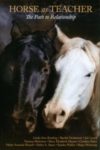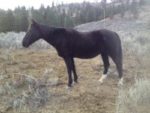Posts Tagged ‘natural horsecare’
Holistic Horse Health: Is Stress Affecting Your Horse’s Liver? (Part 2)
See below for more thoughts from Madalyn Ward, DVM, on the topic of stress and how it affects a horse’s liver function.
~~~~~~~~~~~~~~~~~~~~~~~~~~~~~~~~~~~~~~~~~~~~~~~~~~~~~~~~~~~~~~~~~~~~~~~~
Chronic Stress and the Liver
Chronic stress in horses not only causes excess fat to accumulate in the external tissues but also in the internal organs such as the liver. A fat filled liver can’t perform its critical functions. Signs of poor liver function include general fatigue and lack of focus. Poor digestion is related to lack of bile production. Edema can occur as toxins build up in the tissues and lymphatic system.
In Traditional Chinese Medicine(TCM) the Liver is responsible for the smooth flow of Qi so general stiffness and chest pain are also signs of liver stress. TCM also looks at the liver as the organ that helps one adapt to one’s environment so poor liver function can be related to allergies.
Signs of poor liver function include:
• General fatigue and lack of focusing ability
• Poor fat digestion
• Edema
• Stiffness and chest pain
• Allergies
Solutions for Coping with Stress
In our last newsletter we talked about what causes stress in horses and how to avoid stress when possible. For some horses chronic stress is part of their lives so steps must be taken to support good liver function in spite of it. Nux vomica is a classic homeopathic remedy that helps with liver stress from toxin build up or overeating. Nux is wonderful to help horses showing signs of stocking up or mild impaction colic. Nux is also helpful for horses showing irritability. Herbs that support liver function include milk thistle and dandelion root. Milk thistle can actually help damaged liver tissue regenerate and dandelion root will help with bile production.
More from Madalyn Ward, DVM:
www.holistichorsekeeping.com
www.horseharmony.com
www.horseharmonytest.com
blog.horseharmony.com
http://www.facebook.com/HorseHarmony
Twitter: @madalynward
Healing Laminitis & Metabolic Syndrome with Nutrition: Part 2
By Marijke van de Water, B.Sc., DHMS
Cecal Acidosis aka “Leaky Gut”
Sugars and starches are normally digested with enzymes in the small intestine When large amounts of sugars and starches are fed the small intestine cannot digest them all at once thus the digestive load is forced back into the cecum to ferment. The excess fermentation causes abnormal levels of gas (often causing colic), heat, and acids. These destructive lactic acids destroy beneficial bacteria (probiotics) but are favoured by harmful strains of bacteria such as Salmonella, Streptococcus, and E. Coli as well as yeast cells. These bacteria then produce a variety of different toxins that are very damaging to the colon walls. Read the rest of this entry »
What are we doing to our horses health?

Medical Herbalist
Before we kept horses in artificial environments, they roamed free across large tracts of land, and kept themselves healthy by grazing on a large variety of grasses, grains, herbs, and other seasonal plants. Because they had freedom of choice, they followed their instincts to eat the plants they needed for certain times of the year (breeding, coming up to hard winters, etc.), and ‘self-medicated’ for any salts, minerals or deficiencies to deal with existing or impending health or injury problems.
Animal herdsmen, who had no fences, and who spent their lives watching and worrying about their stock, acquired the knowledge of herbal lore in early times. They had ample time to watch the animals seeking out herbs and weeds in the pasture at different times and they connected with the idea that the choice of particular herbs related to health or injury or seasonal or reproductive demands of the animals. The animals already ‘knew’ what they needed, it was built into their instincts. This is where the term “Horse Sense” came from.
Most horse owners have experienced their horses pulling towards different weeds along the side of the road, or eating their faeces, or turning up their nose at something you offer them, or sampling all sorts of ‘odd’ things if they happen to get into the vegetable garden! They already know what they need.
For tens of thousands of years almost every member of every culture in the World had a good practical knowledge of herbal remedies. This was based in human instinct and experience and upon the practical necessities of survival. There have been those of each generation who took a special interest in healing, who listened, collected, accumulated, experimented and practiced with this knowledge. They became the ‘healers’ of that generation – but every mother and every farmer knew all they needed to know to manage the general health of their children and their stock.
These days – because we have given over the responsibility for our health and that of our animals to conventional medicine and industry – we have increasingly been swamped in science and have lost touch with the basics.
Beyond this, we have subverted the horse’s natural environment, along with healthy exercise requirements, seasonal and feeding and breeding patterns and even social needs. It is little wonder that the modern horse is a more fragile and expensive animal to maintain, than at any previous time in history.
The interference with and subversion of the whole equine health environment has caused catastrophic depletion of their immune systems which is now allowing exotic and across species infections.
A vast industry has sprung up to provide feeds, supplements and medicines along with medically trained practitioners largely attempting to correct problems of our own making. It is also inevitable that shortly the horse will follow human and more recently canine trends toward more and more Cancers to create great business opportunities in equine oncology.
What are we doing…?
———————————–
A Note from Faye: Look out for our upcoming articles about keeping your horse’s diet as natural & healthy as possible as well as creating living environments that allow your horse to be a horse in as natural a setting as possible- no matter what size your property is!
———————————-
A little bit about Robert McDowell
Robert was born in New Zealand and trained as a Medical Herbalist under Australia’s internationally recognized herbalist Dorothy Hall.
He operates from Bathurst, a medium sized rural town in the state of New South Wales in Australia. He has nearly 20 years full time practical experience in treating all medical conditions in people. During the last 12 years he has also been extensively involved in treating animal problems and this side of his work has grown over that time into a national and international mail order service.
Visit his website at:
https://www.herbal-treatments.net/ OR contact him at: info@herbal-treatments.com.au


